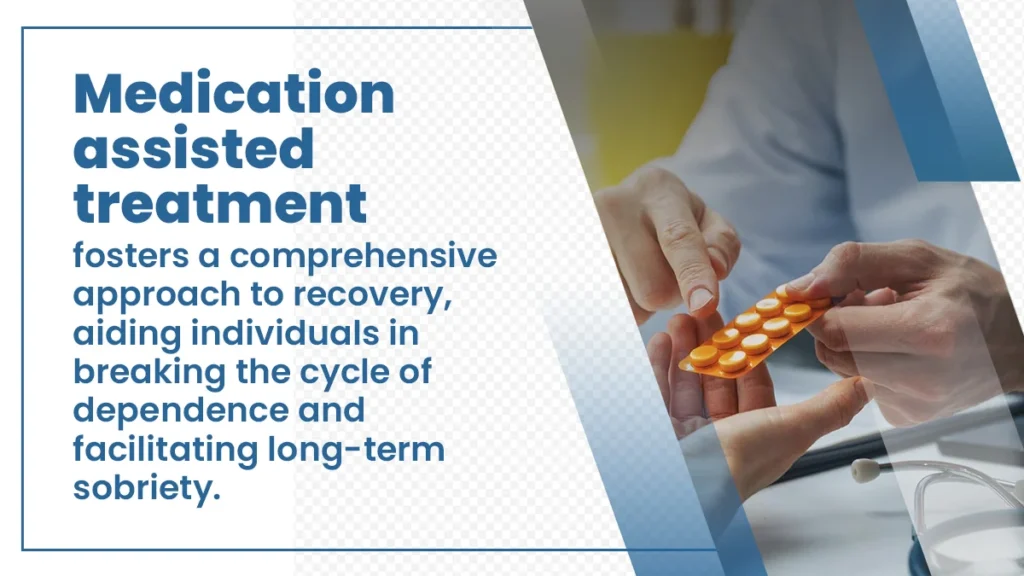Medications for treating alcoholism play a crucial role in supporting individuals on their journey to recovery. These pharmacological interventions are designed to address the complex physiological and psychological aspects of alcohol dependence.
From medications that reduce cravings and withdrawal symptoms to those that deter relapse, the pharmaceutical approach to alcoholism offers a multifaceted solution.
Understanding the diverse range of medications available is essential in tailoring treatment plans, offering a comprehensive approach to help individuals overcome the challenges associated with alcohol addiction.
Key Takeaways
Alcoholism or alcohol use disorder (AUD) is a significant issue in the United States and around the world. Here’s what the article covers:
- Medications like disulfiram, naltrexone, and acamprosate can help reduce alcohol cravings and support sobriety.
- Combining medication with behavioral therapy enhances the effectiveness of alcoholism treatment.
- Consult a healthcare professional to determine the most suitable medication and treatment plan to treat alcohol abuse.
Contact The Haven Detox-New England at (844) 933-4145 for more information and personalized health care to foster long-term wellness.

Understanding Alcoholism
Alcoholism, also known as alcohol use disorder (AUD), is a chronic disease characterized by an inability to control or stop drinking despite negative outcomes. It is a type of substance use disorder that involves a pattern of excessive alcohol consumption, leading to physical and psychological dependence.
Individuals with alcoholism often experience strong cravings for alcohol, tolerance (needing more to achieve the same effects), and withdrawal symptoms when not drinking.
Importance of Medication for Alcoholism Treatment
Medication plays a crucial role in alcoholism treatment by managing the physiological and psychological aspects of addiction. Drugs such as disulfiram, naltrexone, and acamprosate can help reduce cravings, deter relapse, and promote abstinence.
These medications act on neurotransmitter systems, mitigating the reinforcing effects of alcohol. Additionally, medications can alleviate withdrawal symptoms, making the detoxification process safer and more manageable.
Medication-assisted treatment fosters a comprehensive approach to recovery, aiding individuals in breaking the cycle of dependence and facilitating long-term sobriety.
Properly prescribed and monitored, medications contribute significantly to the success of alcoholism treatment programs, promoting better outcomes and improved quality of life for those seeking recovery.
Different Types of Medications
Several medications are used to treat alcoholism by helping patients reduce or quit drinking. These medications work in various ways to address the physical and psychological aspects of alcohol abuse.
Here are some medications commonly used to treat heavy alcohol use:
Disulfiram (Antabuse): This medication works by creating an unpleasant reaction when alcohol is consumed. It inhibits the enzyme acetaldehyde dehydrogenase, leading to an accumulation of acetaldehyde in the body. This buildup results in symptoms such as flushing, nausea, and palpitations when alcohol is consumed.
Naltrexone (Revia, Vivitrol): Naltrexone is an opioid receptor antagonist that reduces the rewarding effects of alcohol. It can help reduce cravings and the strong desire to drink. Naltrexone is available in oral form (Revia) and as a monthly injection (Vivitrol).
Acamprosate (Campral): Acamprosate helps balance neurotransmitter activity in the brain by affecting gamma-aminobutyric acid (GABA) and glutamate. It is thought to reduce symptoms of withdrawal and cravings.
Topiramate (Topamax): Originally an anticonvulsant, topiramate is effective in reducing alcohol cravings. It may also help improve mood and decrease the rewarding effects of alcohol.
Baclofen: Baclofen is a muscle relaxant that has shown promise in reducing alcohol cravings. It may work by affecting the GABA-B receptors, influencing the brain’s reward system.
Gabapentin: Although primarily used for neuropathic pain and seizures, gabapentin has shown effectiveness in reducing alcohol cravings and improving abstinence rates.
Ondansetron: Typically used to treat nausea and vomiting, ondansetron has shown some promise in reducing alcohol consumption, possibly by affecting the serotonin system.
It’s essential to consult a healthcare professional to determine the most appropriate medication for an individual’s situation. Medications should be part of a broader treatment plan that includes counseling, support groups, and lifestyle changes to promote long-term recovery. Additionally, the choice of medication may vary based on factors such as the severity of alcohol dependence, medical history, and individual response to treatment.
Medication Potential Risks and Side Effects
There are two major types of medicines used to treat alcoholism: those that help with withdrawal symptoms and cravings and those that create unpleasant reactions when alcohol is consumed to deter drinking.
It’s important to consult with a healthcare professional for personalized advice due to variations in specific medications and their side effects.
Medications for Withdrawal Symptoms and Cravings
Short-Term Side Effects
- Drowsiness
- Dizziness
- Nausea
- Headache
Long-Term Side Effects
- Weight gain or loss
- Sleep disturbances
- Digestive issues
- Mood swings
Medications to Discourage Drinking
Short-Term Side Effects
- Nausea and vomiting if alcohol is consumed
- Headache
- Flushing or redness of the face
- Anxiety
Long-Term Side Effects
- Liver function concerns
- Fatigue
- Mood changes
- Potential for interactions with other medications
It’s crucial to discuss any concerns or side effects with a primary care doctor, as they can help balance the potential benefits of the medication with any associated negative impacts. Additionally, people with specific mental health disorders or medical conditions, such as liver problems, should be closely monitored while taking these medications.
Role of Psychotherapy in Alcoholism Treatment
Psychotherapy plays an integral role in the comprehensive treatment of alcoholism, often alongside medications. It addresses the behavioral and psychological aspects of alcohol use disorder, helping individuals understand and modify their thoughts, behaviors, and emotions related to alcohol consumption.
The integration of medications and psychotherapy is often called a “combined” or “integrated” approach to treating alcoholism. The interaction between these two methods can enhance the overall effectiveness of the treatment.
Here are some key points about the interaction between medications and psychotherapy in alcoholism treatment:
Enhanced Effectiveness
- Medicines can help manage cravings and withdrawal symptoms, making it easier for people to engage in and benefit from psychotherapy.
- Addressing both the biological and psychological aspects of alcohol use disorder can improve overall treatment outcomes.
Targeted Interventions
- Medications can address specific aspects of alcohol dependence, such as reducing cravings (e.g., naltrexone) or discouraging alcohol consumption (e.g., disulfiram).
- Psychotherapy can then focus on underlying issues, triggers, and coping strategies.
Individualized Treatment Plans
- Combining medications and psychotherapy allows for a more personalized treatment approach, considering each individual’s unique needs and challenges.
- This tailored strategy increases the likelihood of successful recovery.
Long-Term Maintenance
- Medications can be used for long-term maintenance to prevent relapse. At the same time, psychotherapy provides ongoing support and tools for people to navigate the challenges of daily life without turning to alcohol.
Holistic Approach
- The combination of medications and psychotherapy contributes to a holistic approach to substance abuse treatment.
- It addresses not only the symptoms but also the underlying causes and psychological components of the disorder.
Doctors and healthcare providers need to collaborate and communicate effectively when using both medications and psychotherapy to ensure comprehensive and cohesive treatment options for individuals with alcohol use disorder.
Frequently Asked Questions (FAQ)
Are there potential side effects associated with alcoholism treatment medications?
Doctors may give pills to help treat alcohol addiction, but it’s important to be cautious. The use of medications can assist in handling withdrawal symptoms, but there’s a risk of harming the liver, especially if someone already has liver disease.
These drugs may also lead to allergic reactions and other health issues. Always access a healthcare professional for guidance and supervision.
How do psychiatrists treat alcoholism?
Psychiatrists usually treat alcohol misuse using a mix of talk therapy and medications. Behavioral therapies help people change their thoughts and actions linked to alcoholic drinks. The National Institute on Alcohol Abuse and Alcoholism suggests using medicines such as disulfiram, naltrexone, or acamprosate to ease withdrawal symptoms and cut down on heavy drinking.
Clinical trials and research studies approved by the FDA check how well different treatments work. Also, involving family members and joining self-help groups are part of a complete alcohol addiction treatment.
What prescription drug is commonly used to treat alcoholics?
Several medications are used in the treatment of alcohol withdrawal. One commonly prescribed medication for treating alcohol addiction is disulfiram. It works by causing unpleasant reactions, such as nausea and vomiting, when alcohol is consumed, discouraging individuals from drinking.
Other medications like naltrexone and acamprosate are also used to help reduce cravings and support sobriety. Medical professionals determine the most appropriate treatment based on individual circumstances and needs.
If you experience unexpected side effects, contact your healthcare provider promptly. It’s also important to attend regular check-ups to monitor your overall health and the effects of any prescribed medications.
Embrace Lasting Sobriety With The Haven Detox-New England
Start your transformative journey to recovery and lasting healing with The Haven Detox-New England.
Our comprehensive approach combines detoxification and residential treatment programs, providing a safe and supportive environment to beat alcohol dependence.
We understand the complexities of alcohol addiction and tailor our evidence-based therapies to address the unique needs of each individual to assist in achieving lasting growth and healing.
Take the first step towards lasting change. Reclaim your life and rediscover hope. Contact us at (844) 933-4145 today to start your journey to sobriety.




